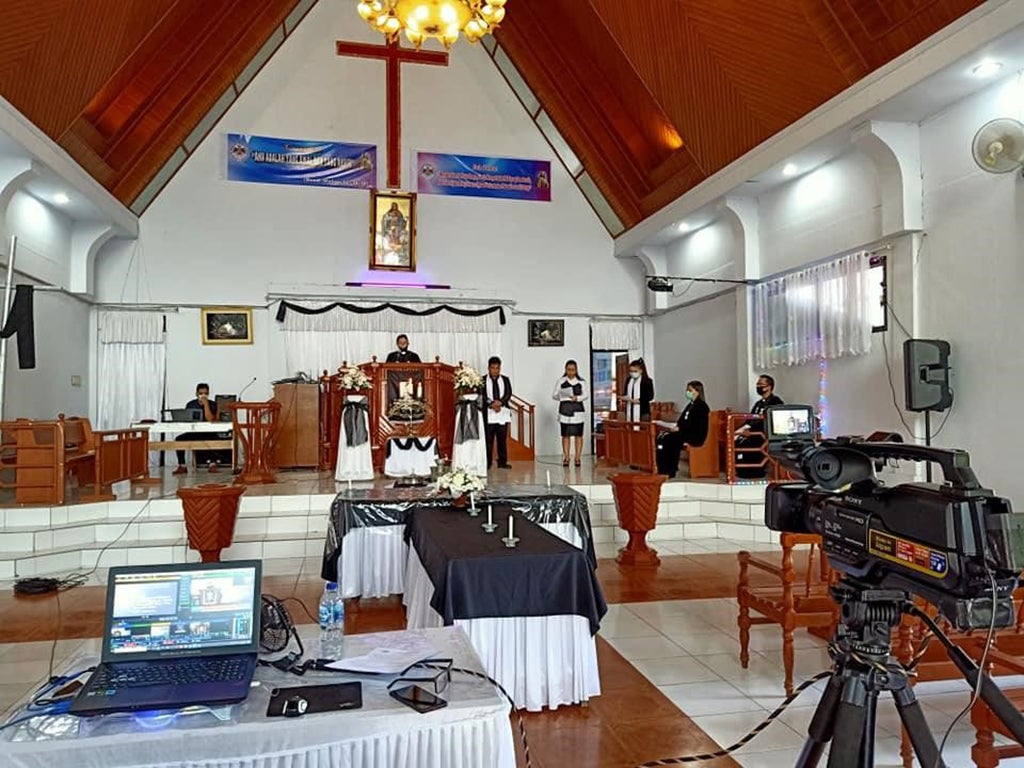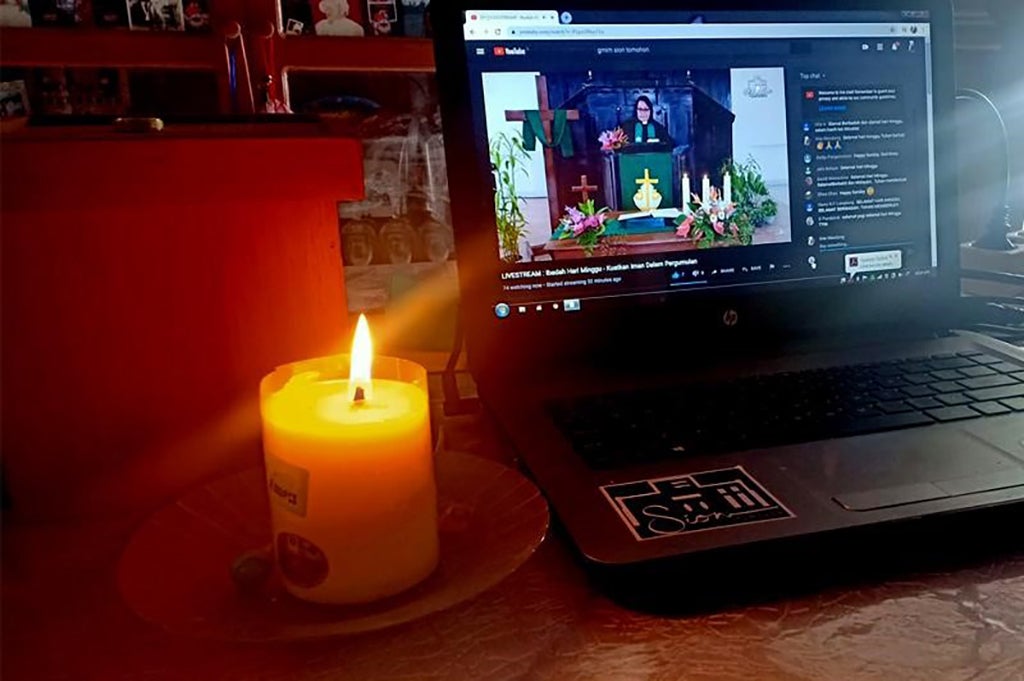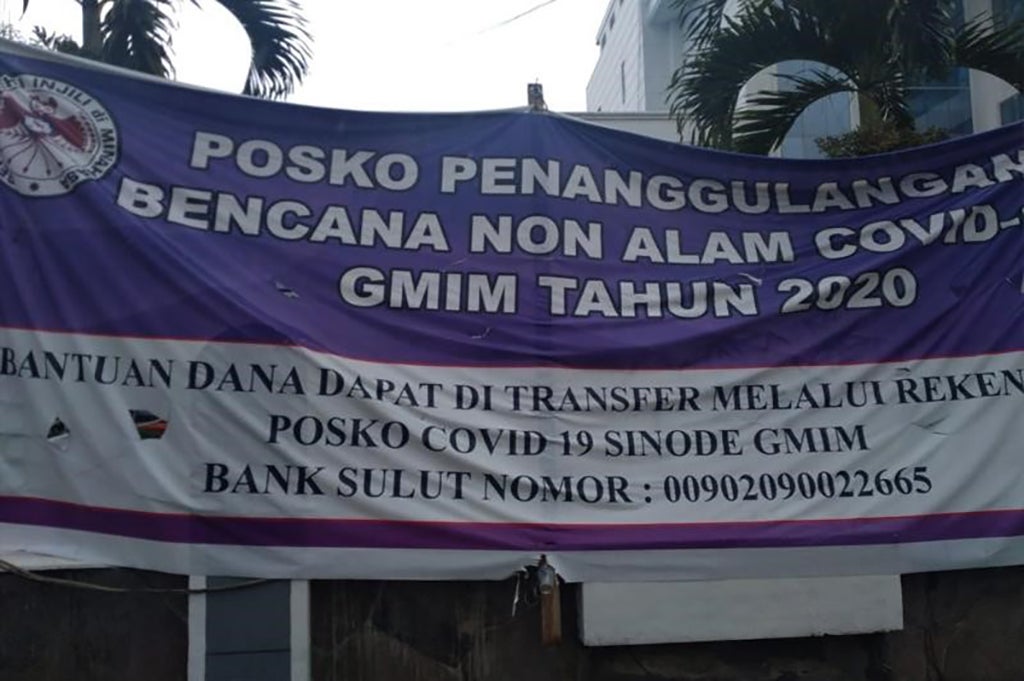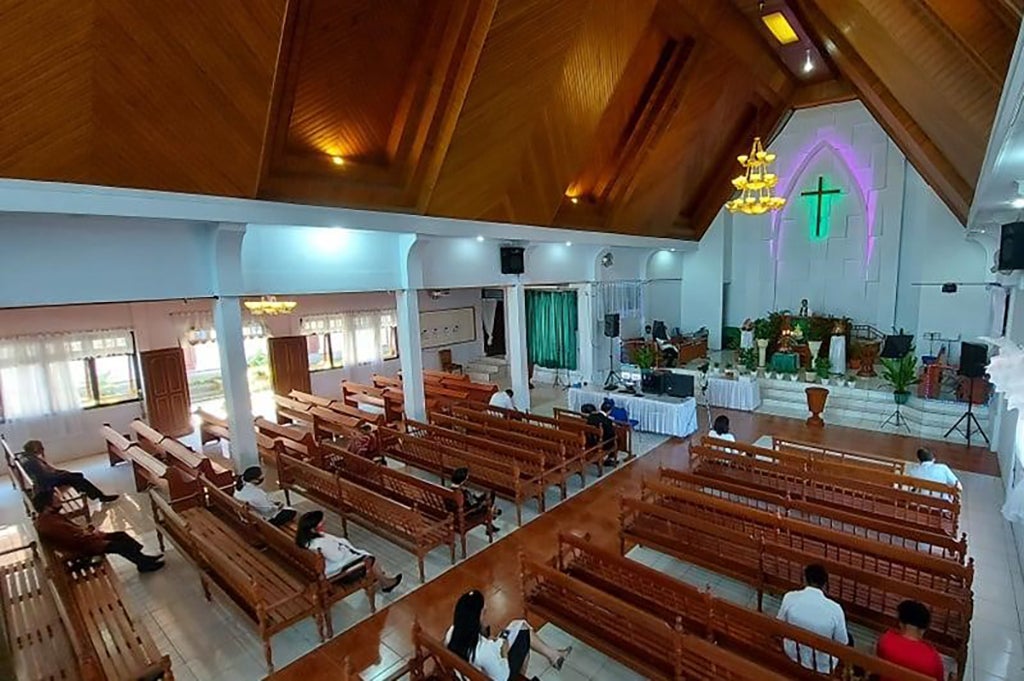Minahasan Church’s Response to COVID-19 in North Sulawesi, Indonesia
contributed by Denni H.R. Pinontoan, translated from Indonesian by Erica M. Larson, 10 October 2020
The first case of COVID-19 in Indonesia was announced by President Joko Widodo on March 2, 2020. Soon after, the government implemented a health protocol to prevent the spread of the coronavirus, initially called “social distancing,” but later replaced by the term “physical distancing.” Starting in Jakarta, the coronavirus then spread outward to other regions.
On March 31, the government issued a presidential decree to declare COVID-19 a public health emergency. Following April 13, 2020, the government issued another presidential decree regarding non-natural disasters to declare the spread of the coronavirus as a national disaster.
The first COVID-19 patient in the majority-Protestant province of North Sulawesi was announced on March 14, 2020. The provincial government then circulated the governor’s regulations related to the efforts to overcome the spread of the virus. After which, the Synod Council Workers’ Organisation, the governing body for the Christian Evangelical Church in Minahasa (GMIM - Gereja Masehi Injili di Minahasa) accordingly issued several letters of guidance to its members related to preventing the spread of the coronavirus. The purpose of these letters was to communicate the response of the GMIM Church to the COVID-19 pandemic, in the form of appeals to follow health protocols and therefore to establish guidance to temporarily avoid worship in church buildings. All spiritual activities were to be transferred online.

Figure 1: Worship among one GMIM congregation in Tomohon is directly broadcast via cable TV and social media during the pandemic. Camera and computer equipment for the broadcast are visible. (Photo credit: Rocky Ngantung, source: Facebook)

Figure 2: A Church member joins worship from home with digital technology (Photo credit: Irne Mandang, Source: Facebook)
The Church and the State in Responding to the COVID-19 Pandemic
The province of North Sulawesi is located on the northernmost tip of the island of Sulawesi (Celebes). The inhabitants of this island are ethnically and religiously diverse, especially in the provincial capital of Manado. Nevertheless, of the main religious groups present in the province, most are predominantly Protestant Christian. Minahasans inhabit all seven districts and cities of North Sulawesi (territorially referred to in ‘adat’ or traditional terms as tanah Minahasa, or the land of Minahasa). The ethnic groups of Sangihe and Talaud, each consisting of several sub-ethnic groups, are also primarily Protestant Christian. Only the Bolaang Mongondow ethnic group, which consists of several sub-ethnicities, is majority Muslim.
GMIM is the Church with the largest membership in Minahasa. The congregations are spread across the regions and cities of North Sulawesi. The history of the Church can be traced back to the 17th century, when the Dutch East India Company arrived in Minahasa, continuing during the era of the Dutch colonial government from the 18th to the mid-20th century. During the 19th century, the Protestant Christian religion from the Netherlands was introduced widely by missionaries from the Dutch Missionary Society.
GMIM’s theological understanding regarding its relationship to the state or government can be found in chapter 25 of the Church Order: “GMIM is called to have a cooperative relationship that is positive, creative, critical, realistic, and dynamic, with government and civil organisations in all forms of activities which do not conflict with the Church Order.”
The GMIM leaders’ response to the COVID-19 pandemic with letters of guidance in following protocols issued by the government and medical authorities demonstrates how the Church worked to engage with the state as a partner in its response to the pandemic and its responsibility for public health. As the largest Church in the region with an organisational structure down to the smallest communities (congregations and villages), the GMIM response has played an important social role for the community.
Since its founding in 1934 (still during the colonial period), GMIM has understood itself as part of the social life of society. In that vein, GMIM established hospitals, clinics, schools at all levels, and orphanages. As such, GMIM ultimately views itself as inseparable from secular life, and this is in line with the theology that has influenced the GMIM Church, namely Calvinism.
Ambiguous Response
However, after a little more than two months of the pandemic, the response changed slightly. Though still based on its earlier positioning, GMIM as a politically and economically established organisation faced an issue related to its basis in a theological understanding which is somewhat perplexing. The protocol of COVID-19, primarily maintaining distance - and in this case congregational meetings in church buildings or worship locations - was seen as having an excessively strong negative impact on the institution as well as the spiritual community. Notably, there was a pressing institutional problem: finances. GMIM routinely pays the salary for as many as 2,463 Church workers and funds other institutional activities. The primary source of income for GMIM is directly from its 951 congregations.
Meanwhile, it is clear that the COVID-19 pandemic has had a negative impact on the local economy in North Sulawesi. As congregational worship cannot be conducted in Church buildings, the collection of offerings has been impacted, resulting in a decrease of income for the synod.

Figure 3: GMIM’s response to the COVID-19 pandemic by opening a post for aid from and for members. This announcement was displayed in front of the GMIM Synod Office in Tomohon (Photo credit: Denni H.R. Pinontoan)
A letter from the Church’s governing body on the “new normal” dated June 19 explains that the synod office in Tomohon will be re-opened with limited hours (9 AM - 2 PM), and that they will prepare for a re-functionalisation of Church buildings for congregational worship. The basis of the policy was a decree from the Indonesian Minister of Health regulating health protocols for holding public activities during the COVID-19 pandemic.
Then, the Church’s governing body issued a letter on July 6 to follow up on their earlier correspondence. The main point of the letter was to notify of the implementation of the ‘new normal’ in service to restore the function of the Church to increase the spirituality of its congregation and strengthen the responsibility of serving its servants. It is interesting to note that the letter specifically mentions the intention to “avoid liberalism and secularisation from the devil in the Church…”

Figure 4: Sunday service at one GMIM congregation attended by few people due to COVID-19 protocols (Photo credit: Rocky Ngantung, Source: Facebook)
The letter implies that Church members ceasing to worship together in churches is the same as the Church ceasing to exist as an institution. In actuality, the meeting of congregational members to worship together is in practice not limited to spirituality, but also relates to financial support for its institutional structures. The confusing aspect is when the reasoning for re-opening is linked to the danger of “liberalism, secularisation, and the devil.” The first two terms were actually not extensively discussed in a serious and thoughtful manner by the Church prior to the pandemic. So, concerning the statement made regarding the re-functionalisation of Church buildings, the result is an ambiguous attitude of the Church toward the COVID-19 pandemic. On one hand, the Church has been fearful about the impact of COVID-19: reacting by implementing health protocols. On the other hand, due to an urgency of organisational demands, an additional understanding has emerged in which the absence of worshippers inside Church buildings —adhering to following public health protocols— represents a danger of “liberalism and secularisation” among the congregations.
In conclusion, this ambiguous response of the Church in Minahasa demonstrates two things:
- Firstly, the COVID-19 pandemic which initially impacted health, has sparked efforts to redefine the relationship between the Church and the State, as well as modern medical science. However, it appears that the Church’s response was not primarily motivated by a deep theological attitude and an authentic social commitment, but primarily by fear.
- Secondly, a weak theological understanding combined with an organisational structure which is politically and economically established in ‘normal’ times, turned out to be fragile in facing a pandemic capable of deconstructing the old ecclesiastical structure.
Disclaimer: The views and opinions expressed in this article are those of the authors and do not necessarily reflect the position of the blog editorial team or the Asia Research Institute.
South Asia | Southeast Asia | East Asia | Other Places | Hinduism | Buddhism | Islam | Christianity | Other Religions

